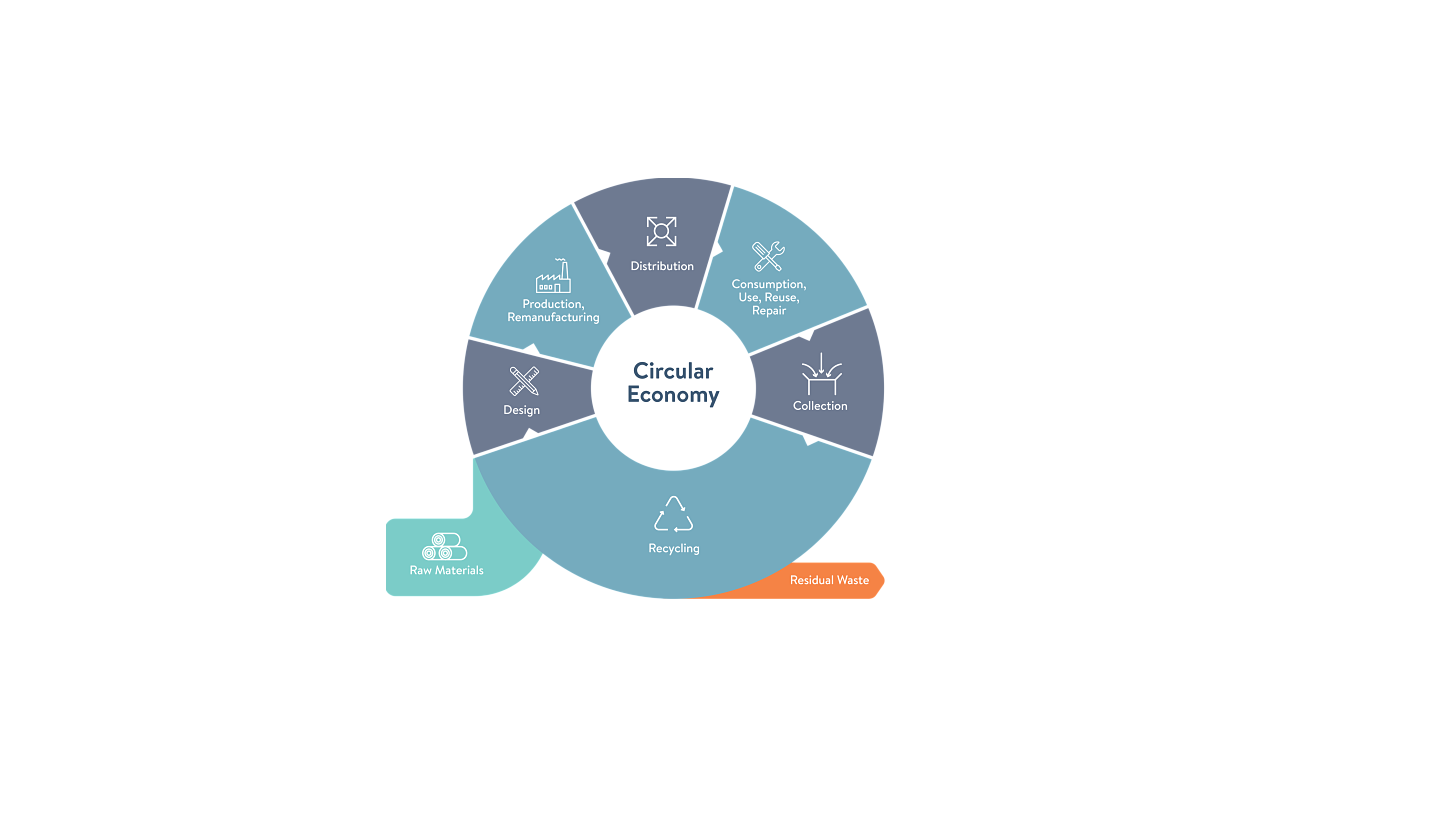Circular Economy & Sustainability

Circular Economy
The circular economy is a transformative approach to running a business, being a consumer and to economic and community development in general. The approach or model aims to minimize waste, promote sustainability, and maximize the efficient use of resources. Unlike the traditional linear economy, which follows a "take-make-dispose" pattern, the circular economy seeks to create a closed-loop system where products, materials, and resources are kept in circulation for as long as possible. In practice, it involves sharing, leasing, reusing, repairing, refurbishing and recycling existing materials and products.
In a circular economy, the emphasis is placed on designing products that are durable, repairable, and easily recyclable. This design philosophy extends the lifespan of products, reducing the need for constant replacements and conserving raw materials. The concept encompasses various strategies, including recycling, remanufacturing, refurbishing, and sharing or leasing products instead of owning them outright.
Key principles of the circular economy include:
- Design for longevity: Products are designed to last, incorporating quality materials and components that can withstand wear and tear, reducing the frequency of replacements.
- Reuse and refurbishment: Instead of discarding products at the end of their initial use, they are refurbished, repaired, and upgraded to extend their functional life.
- Material recycling: Materials from discarded products are collected, processed, and reintroduced into the production cycle to create new items, reducing the demand for virgin resources.
- Waste reduction: Waste is minimized by encouraging efficient production processes and reducing excess packaging.
- Sharing economy: Collaborative consumption models are promoted, such as car-sharing and tool-sharing platforms, which allow multiple users to access the same product.
- Reverse logistics: Manufacturers take responsibility for retrieving used products for remanufacturing or recycling, closing the loop between production and disposal.
The circular economy offers numerous benefits, including the reduction of environmental impacts, such as lower greenhouse gas emissions and reduced resource depletion. It also fosters innovation in product design, manufacturing processes, and business models. Moreover, it has the potential to generate new economic opportunities, such as job creation in recycling and remanufacturing sectors.
Transitioning to a circular economy requires a shift in mind-set, collaboration among various stakeholders, and supportive policies. Governments, businesses, and consumers all play an important role in driving this transformation, contributing to a more sustainable and resilient future.
For more information, please see: Whole of Government Circular Economy Strategy 2022 – 2023 https://www.gov.ie/pdf/?file=https://assets.gov.ie/207622/bd90130d-494e-4d32-8757-46d36c77b912.pdf#page=null
Interested in applying circular economy principles in your business?
LEO Dublin City and Dublin City Council have been developing and collaborating on various initiatives to support businesses to become more sustainable, to adopt circular economy principles and to adopt a low carbon approach to their operations. These initiatives which can help you and your enterprise are listed below:
Green for Business
Green for Business - an initiative from the Local Enterprise Offices to help prepare small businesses for the low carbon, more resource efficient economy of the future. This is a FREE programme, available to companies with up to ten employees.
Links for Information and application:
Local Enterprise Office (submit.com)
Energy Efficiency Grant
The Energy Efficiency Grant supports the investment in technologies and equipment identified in a Green for Micro Report, GreenStart Report or a SEAI Energy Audit with 75% of eligible costs up to a maximum grant of €10,000.
Greenstart
Greenstart is a grant for a training / consultancy / advisory project of up to 7 days carried out by an external Green Service Provider directly with an eligible business. The aim of the project is to improve the environmental performance of the business thereby increasing the agility and resilience of clients to climate change impacts. The grant is intended for businesses unfamiliar with or lacking sufficient capability in environmental improvement methodologies.
MODOS
MODOS is a circular economy programme that provides training, mentoring, networking and events for Irish based micro, small and medium size enterprises, to help them embed circular principles in their business model. It is a joint initiative of Dublin City Council and the Eastern-Midlands Regional Waste Management Planning Office and can be delivered in collaboration with other partners. Information on networking events and training sessions available at www.modos.ie. Further resources on the circular economy available at https://modos.ie/resources/
